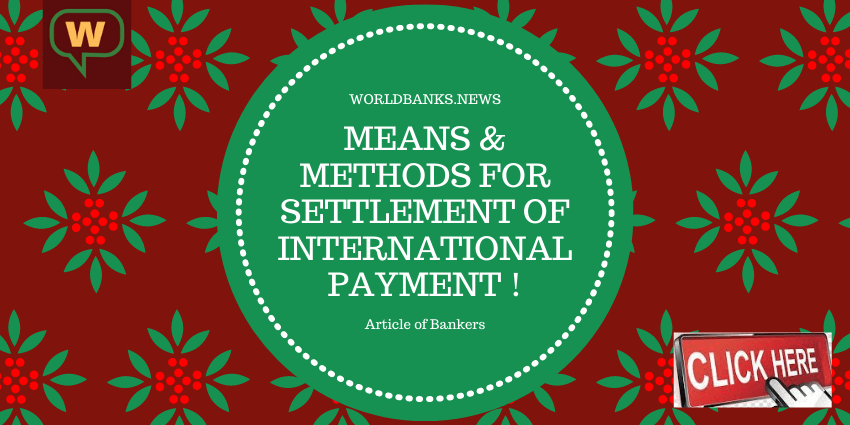MEANS & METHODS FOR SETTLEMENT OF INTERNATIONAL PAYMENT
-
-
What do you mean by “correspondents”?
Ans. If a bank has no overseas branches at centre, it keeps a balance with some other bank which is prepared to act as its agent in exchange dealings. Banks acting as agents of other bank are called ‘correspondents”
-
What is agency arrangements? What is the objectives of agency arrangement? What are the common business transaction done through agency arrangement?
Ans. Agency arrangement: Agency arrangement means establishment of correspondent relationship between two separate banks situated in two different countries. Agency arrangement is established in order to channelise/route foreign exchange transactions of the two banks under the arrangement with ultimate goal to ease and promote the business of the banks, in broader sense, of the two countries involved.
-
-
Objectives of Agency Arrangement: Agency arrangement is established in order to channelise /route foreign exchange transactions of the two banks under the arrangement with ultimate goal to ease and promote the business of the banks, in broader sense, of the two countries involved.
-
Common business transactions done through Agency Arrangement: i). Fund transfer.
-
ii). Collection of bills of exchange & cheque.
-
iii). Issuance of TT/DD/MT.
-
iv). Establishment of L/C & arrangement for reimbursement/settlement of credit.
-
v). Advising/Confirming of amendment of L/C.
-
vi). Sale & purchase of foreign currencies. vii). Issue & confirming of guarantees.
-
viii). Add confirmation of L/C’s
-
ix). Furnishing of credit information.
-
Write short notes on the following:
Ans. a). Stock Draft: It is a bill of exchange drawn by a seller of stock or shares on buyers of foreign exchange accompanied with the relative stock of shares. The accompanying stocks or shares provide the security to the banker at the time of purchase the bill.
-
-
b). SWIFT: The vast growth in international business has put increasing pressure on banks communication. In 1973, in an attempt to overcome this problem, Society for Worldwide Inter Bank Financial Tele Communication (SWIFT) was founded. It was founded as a cooperative non profit organization & it’s Head quarter are in Brussels, Belgium. It was constituted under Belgium law & original membership was 239 banks in 15 countries. Message switching centre operates in Amsterdam, Brussels & Virginia. SWIFT undertakes quick transfer of funds, transmission/communication of letter of credit & other remittance worldwide.
-
c). CHIPS: Clearing house inter bank payment system (CHIPS) was set up in 1970 under New York clearing house. Initially it serviced only international payment & across to the system was restricted to banks belonging to the New York clearing house association. But within a short period of time domestic transfers were brought into the system & the association gave access to the agencies & branches of foreign banks as well as other US commercial banks and the like.
- d) Bullion: Particularly is gold & readily acceptable in settlement of international debts. When as a result of large deficit in the balance of payment, there is disequilibrium between demand & supply of foreign currencies, price of credit instrument on foreign countries becomes high, it may move to a point when it is cheaper to discharge foreign debtors in gold. However realistically it is only a theoretical importance so far as international payments are concerned.
e). Circular Letter of Credit: Circular Letter of Credit are issued by the Bank for traveling abroad. It is a letter addressed to the correspondent bank authorizing them to make payment to the holder of the letter up to the amount mentioned in the letter. A separate letter identifying the signature of the beneficiary is issued & the beneficiary is advised to keep the circular letter & identification letter separately to avoid forgery.06.07.09 reviewed.
-
f). EURO CHEQUE: The EUROCHEQUE scheme is a system under which travelers may encash their personal cheques throughout European countries without any formalities. Most of the leading European & British Banks have subscribed to this system and they provide travelers with special cheque guarantee cards, usually valid for one year, against which their personal cheques are encahsed at Banks in Europe up to an agreed limit.
-
g). Counter Trade: Counter Trade is said to be a strategy to strengthen/make stronger the balance of payment position by reducing the gap between import & export. Under counter trade, two parties are agreed to buy & sell from other without involvement of payment for each of the transaction.
-
h). Counter purchase: It is a transaction whereby the exporter agrees to purchase the goods of a value equal to an agreed percentage of export sale contract.
-
i). Offset: It is usually applied to defenses, aero spaces & high technological contracts. Offset is in fact an umbrella term for reciprocal trade transactions involving situation where manufacturing capacity is shifted to another country as a means of achieving sales.
-
j). Switch Trading: It is a transaction in which several countries link up in a daisy chain whereby accounts payable to one country to another (in form of goods/ currencies/ services) are transferred to one or more third countries.
-
k). Buy back: It is a transaction which contains a commitment to purchase goods that are manufactured using the industrial plant sold under the export sales contract.
-
l). COMECON: These letters stand for Council for Economic Assistance. COMECON is the trade organization of east European countries in Europe. The organization aims to closer integration among the member countries and co ordinates their respective 5 years plan.
-
How many participants in the foreign exchange market?
Ans. The participants in the foreign exchange market can be classified under following:
-
-
a). Corporate : The business houses, international investors and multinationals operate to meet their requirement for spot or forward currencies.
-
b). Commercial Banks: Main players of the market who buys & sale in response to their clients requirement.
-
c). Central Banks: Central bank may participate in the market to influence the exchange rates especially when it apprehends a draw down of the foreign currency reserves or to ward off speculative pressure.
-
How many categories of transactions therein in foreign exchange market?
Ans. i). Transactions between banks and their customers.
-
-
ii). Transactions between different banks dealing in foreign exchanges in the same market (inter bank dealings)
-
iii). Dealings in foreign exchange between banks in different centers.
-
iv). The purchase and sales of currencies between the central bank of a country and other banks in the same country.
-
v). Between central banks of different countries.
-
How many categories of transactions therein in foreign exchange market of Bangladesh?
Ans. The market in Bangladesh is essentially a three tiered one:
- Between Bangladesh Bank and authorized dealers in foreign exchange (banks).
- Between banks and their correspondents and branches abroad.
- Between banks and their customers. 07.07.09 reviewed
-




















